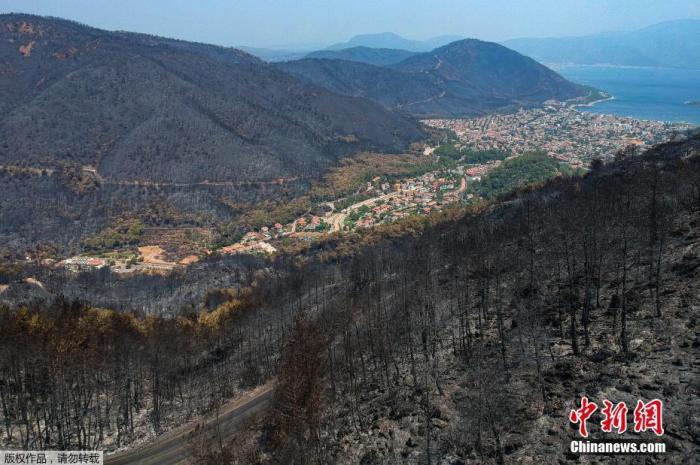China News Service, August 8th. According to a report by the European Times on the 7th, forest fires in countries along the Mediterranean coast such as Turkey and Greece are still raging, and many people have been killed and injured.
However, the analysis said that the fire may worsen.
Experts also warned that the next disaster is likely to be close at hand.
On August 3, local time, wildfires burned in the suburb of Varympompi in northern Athens, Greece.
Wind-assisted fire, many countries in the Mediterranean are caught in a "sea of fire"
Affected by high temperature and strong winds, many places such as Greece, Turkey, Albania, North Macedonia, and Bulgaria were hit by forest fires.
In Greece, the worst-hit areas are located in northern Athens, the island of Evia and the Peloponnese Peninsula.
Thousands of residents had to be evacuated by ferry because the land route was cut off by the fire.
As of August 7, there are still at least 56 fires burning across Greece.
A total of 2 people were killed in the fire and dozens of others were injured.
The situation in Turkey is still grim.
As of the 6th, 13 fires in 6 provinces of the country have not been brought under control.
The resort areas of Antalya, Marmaris and Bodrum have been particularly affected.
The fire has killed at least 8 people, injured hundreds of people and evacuated tens of thousands.
At present, the situation in Antalya has calmed down, but the fire destroyed the entire local village.
The disaster control agency had to set the container as an emergency shelter.
The fire also engulfed large tracts of forests and fields.
Turkish President Erdogan said that the fire was the worst in the country's history.
Also in the "sea of fire" is Italy.
In Italy, the fire brigade extinguished hundreds of fires.
Sicily, Calabria and the southern regions of Puglia have been particularly affected.
The Molise area has entered a state of emergency.
On August 7, local time, aerial photography of the Mugla mountain fire scene in Turkey, a large area of forest was burned to ashes, the picture was shocking.
Severe fire "old enemy" turned to join forces to put out the fire
Since the fire broke out, Greece, Albania, Italy, North Macedonia and Turkey have asked the EU for help.
The EU has a civil protection mechanism through which affected countries can request assistance.
There is also a fire brigade called "rescEU", most of which are funded by the European Commission.
What is surprising is that the Greek Foreign Minister recently announced that Greece and Turkey hope to help each other and join forces to put out the fire.
For decades, these two "old rivals" have been fighting over the Mediterranean sovereignty dispute. Just a few months ago, the relations between the two countries have even deteriorated further.
Other countries have also extended a helping hand to join forces to put out the fire.
Up to now, Ukraine, Switzerland, Romania, Spain, Croatia, etc. have dispatched firefighters and firefighting aircraft.
On August 3, local time, wildfires burned in the suburbs of Varympompi in northern Athens, Greece, and some houses and vehicles were damaged.
Tracking down the "murderer" These factors cause frequent forest fires
Fire ecologist Johann Goldammer said in an interview that climate warming, urbanization-induced farmland abandonment, changes in human lifestyles, and the government’s lack of awareness of crisis management have all contributed to frequent forest fires. reason.
In addition, frequent severe forest disasters and climate warming have also fallen into a vicious circle.
Douglas Godbold, a professor of forest ecology at the Vienna University of Natural Resources and Life Sciences, said that global warming has increased the risk of fires, but a large number of wildfires is also a disaster for the climate itself.
After being burned down, the forest may no longer grow, and no longer absorb carbon dioxide, and the temperature warming problem will increase.
Even more worrying is that the UN Intergovernmental Panel on Climate Change has warned that extreme fires in Greece and Turkey will get worse in the future.
In particular, due to the severe impact of climate change, the desertification in Greece is intensifying.
Christos Zerefos, Dean of the Greek Institute of Research and Innovation, also said that the extreme high temperature and drought in recent years have always caused forest fires to repeat, and the next disaster is close at hand-the first rain in autumn. , It is often easy to cause floods, because it is likely that there will not be enough trees to effectively prevent the spread of water.

